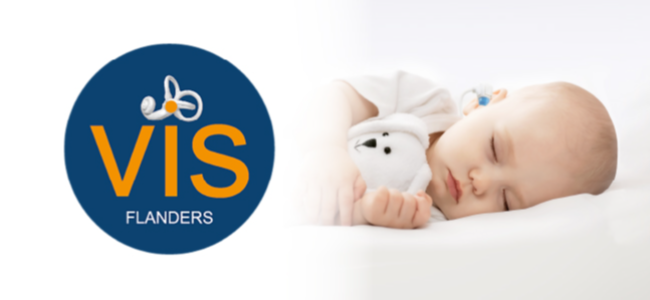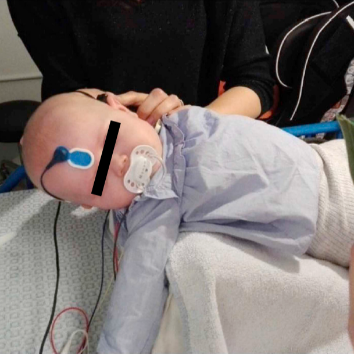For the first time ever, the vestibular screening of the hearing-impaired children—the Vestibular Infant Screening-Flanders project (VIS-Flanders project)—started in Flanders (Flemish Region of Belgium) in June 2018. The project implies investigation of the vestibular function in children (6 months and older) who failed at hearing screening at birth and have a confirmed hearing loss by means of recording the vestibular evoked myogenic potentials (VEMPs).
Why is it important? Children with confirmed hearing loss (no matter unilateral and/or that of slight degree) are at risk of vestibular dysfunction, which is confirmed by numerous studies. This interrelation can be explained anatomically: the structures of acoustic and vestibular systems are located close to each other so that the factors (such as genetic mutations or congenital infections) that cause hearing impairment may also cause vestibular dysfunction. This in turn may lead to severe developmental delays (including motor and cognitive) and seriously reduces the quality of life later on. That is why the sooner vestibular dysfunction is identified, the sooner rehabilitation is started.
Today, universal newborn hearing screening is a common practice worldwide. However, there is no systematic approach to vestibular screening and diagnosis of vestibular disorders in infants and children.
Aim of the project. The project aims at promoting change of the given situation and increasing the awareness for vestibular dysfunction and its associated symptoms in hearing-impaired children. Under the project, the technique sensitivity will be determined (based on one of the audiological reference centers of the Ghent University) and the accuracy of the screening protocol will enhanced, if necessary.
All, namely twenty five, official Flemish reference centers will participate in the project using Neuro-Audio system produced by Neurosoft to record VEMPs. A more comprehensive vestibular screening protocol for all children with hearing loss is implemented at the Ghent University Hospital.
Screening protocol. Every year about 60,000 of Flemish newborns are screened for hearing impairments with the AABR technique. About 700 (or 1.2%) of them, those who fail to pass the second screening, are referred to one of the audiological reference centers for further diagnostics–to perform ABR test. The test should be carried out before the age of 6 months. The congenital hearing loss is confirmed in about 120 to 140 of these children annually. This is the time for the VIS-Flanders project when 6-month old babies with the confirmed congenital hearing loss undergo vestibular screening (with written consent of the parents).
The vestibular screening implies recording of the bone-conducted cervical VEMPs with a 500 Hz tone bursts of 59 dB nHL intensity (to eliminate possible middle ear problems common for babies, due to otitis, for example). The baby is placed with their back down on the bed wedge pillow; their head is turned to the side where the parents are entertaining the little patient. A part of the vestibular organ is stimulated with sound vibrations and tested by holding a small device (bone conductor) behind the ear.
For a ‘pass’ result, a reproducible VEMP response (p13 and n23 peaks on the trace) with latency within the normal range (determined at the Ghent University Hospital for a group of 34 healthy infants, mean age is 7.6 months). If the result is considered unreliable, due to insufficient muscle tension in the neck for example, the screening is repeated within 3 months. In case of a ‘pass’, the repeat screening is not performed. The patients with a ‘refer’ result are referred to a specialist for assessment of motor function and, if necessary, rehabilitation. Parents are also given additional information about the vestibular disorders.
Preliminary results of the project in 1.5 years (the end of 2019). 9.5% of babies with hearing loss got ‘refer’ result during vestibular screening. The VIS-Flanders project has proven the feasibility of vestibular screening on a regional level with a participation rate of 86.7%. Confirming previous studies, a significantly higher number of infants with severe hearing impairment and deafness (even unilateral) failed to pass the screening (refer rate = 14.7%) if compared to children with less severe hearing impairment (refer rate = 1.5%). Of all the children with slight to moderate hearing impairments (under this study), only 1 patient failed the vestibular screening!
Among them, the refer rate is 18% and among children with slight to moderate hearing impairment the refer rate is only 2%. One case of unilateral semicircular canal dysfunction was identified during a comprehensive diagnostics at the Ghent University (not detected at screening), indicating that it is important to determine the sensitivity of the screening technique and to make adjustments to the screening protocol. The project will continue until July 1, 2022 minimum.
Results after 2.5 years (October 2020). 236 infants with confirmed hearing loss participated in the screening (mean age: 7 months). Of them, 11% received a ‘refer’ result. At the same time, 29% of infants who underwent the complete vestibular screening at the Ghent University Hospital received a ‘refer’ result. Most of the infants who failed during the screening had a severe hearing impairment or deafness (unilateral or bilateral). The refer rate among them was 18%, whereas refer rate among infants with slight to moderate hearing impairment was only 2%.
Publications:
- Martens et al. Vestibular Infant Screening – Flanders: The implementation of a standard vestibular screening protocol for hearing-impaired children in Flanders (International Journal of Pediatric Otorhinolaryngology, 2019).
- Martens et al. VIS Flanders – Results after 1.5 years (Scientific Reports, 2020).
- Martens et al. VIS-Flanders – Results after 2.5 years (Poster, 2020).
Web-site (English version): https://vis-flanders.be/en/.

